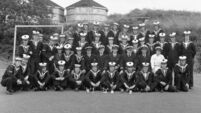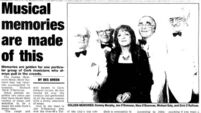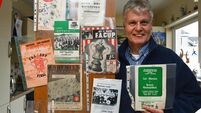A precious photo of my mother in Cork in 1929: within a year, all three of her sisters were dead
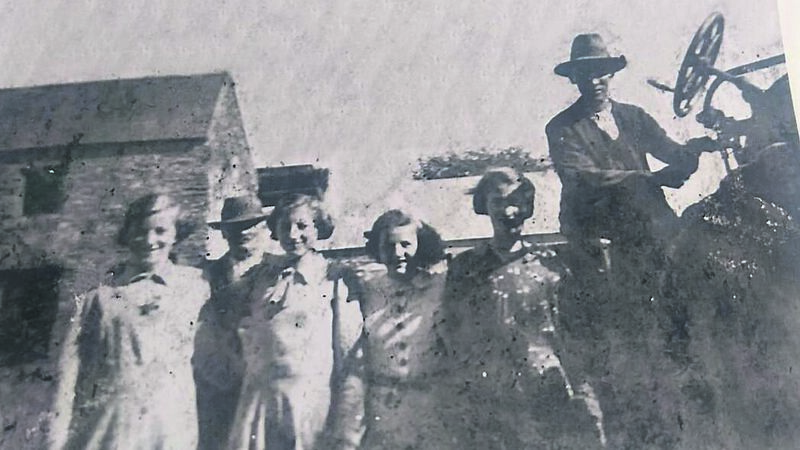
POIGNANT PHOTO: Josephine Buckley, nee Corcoran, her three sisters, Kitty, Nan and Mary, and their father Denis on their farmstead in Farnanes after a day’s threshing in 1929 — the man on the tractor is a farm worker
DURING the pandemic, my brother found an old photograph of my mother and her three sisters, smiling away happily after a threshing on their Cork family farm.
The picture, which also included their father and a farm worker, was taken at the homestead in Knockshanavee, Farnanes, Co. Cork, in, we believe, 1929.
It was a remarkable find, given what we know happened within a year of that picture, taken on that sunny summer’s day.
The following May, my mother’s three sisters contracted diphtheria, a deadly illness in its time, and died within three weeks of each other, aged 13, 16, and 25.
The photo is the only one we have of the Corcoran sisters together — and we don’t know for sure which of them is my mother — and prompted me to write this account.
Although my mother, Josephine Buckley, nee Corcoran, went on to marry and have a family of her own, she too died well before her time, aged just 40 — yet her positive, upbeat attitude to life is what I will always cherish the most.
******
The crunch of my mother’s heels hitting the gravelled pathway still rings in my ears as I remember that day in 1955, as we stood on the doorstep and watched her walk away. She turned to wave before seating herself beside my father for their final journey together.
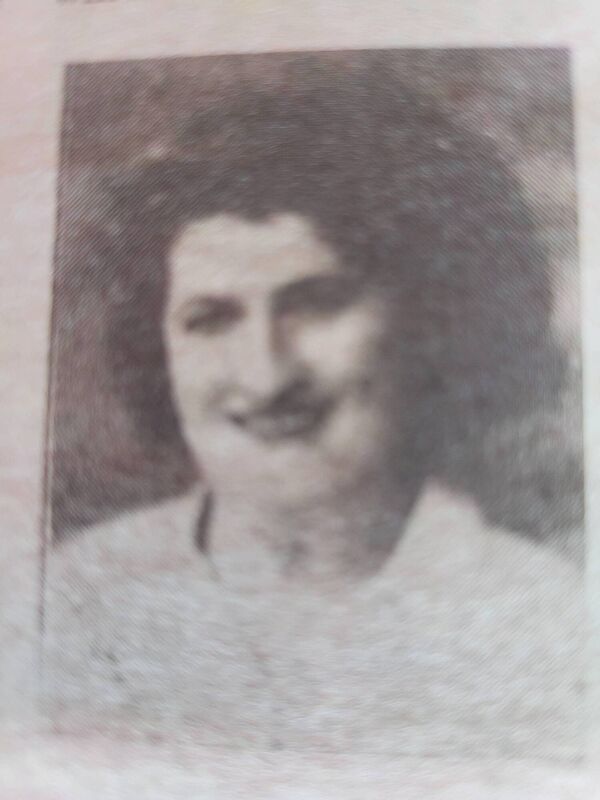
We had witnessed her illness for some time. When the doctor said she had to undergo gallbladder surgery, I remember her reluctance to leave her seven children: my youngest sister Mary was just two at the time, and the eldest, Jack, was 13.
Some nights later, on October 24, 1955, we were awoken by the sound of a car arriving at our house, followed by my father’s anguished exclamation: “She is dead.”
Being only six, I had no real understanding of what this meant. Later, I witnessed my father cry uncontrollably along with a roomful of adults, in varying states of distress, including his friend, Thomas O’Callaghan of Coachford, whose job it had been to bring tidings of this sad news.
I was in utter confusion, I had never seen adults cry. I had often seen this noisy bunch laughing, chattering and playing cards as they were a gregarious lot when they came together for their frequent get-togethers.
In those days, it was generally understood that children should be seen and not heard. There were no child counselling services, one was left to one’s own devices to try and make sense of the world.
The concept of death evaded me at this stage, I have no memory either of how it impacted my six siblings then, but as time went on, I do remember the inexplicable void in our lives and feelings of complete misery. After all, to lose one’s mother in childhood equates to the loss of a natural right, a feeling that still unearths an inherent anger even to this day.
However, I am also realistic and pragmatic enough to know that life does not guarantee any promise of Utopia. Nobody knew this better than my mother. In her day, death was part of life.
She was one of a family of five girls and three boys. Even before the devastating visit of diphtheria to their doorstep, their sister Elizabeth had died in infancy.
The death of a child can be a cruel kind of education. My mother and her sisters attended the South Presentation Convent Secondary School in Cork city. They had to walk from home to catch the Macroom-Cork train at Crookstown to get there.
It was not the norm in the 1920s and ’30s for girls to receive a secondary education, but my grandfather Denis Corcoran set a high value on schooling as his ancestors had been hedge schoolmasters in the parish of Kilmichael.
He was born into a small-holding there and went on to be a monitor teacher in the parish school of Toames. In the mid-1880s, after his father, John, had been evicted from Kilmichael, the family returned to the farmstead in Knockshanavee, where Denis’s mother and my great grandmother, Hanora Coveney, was from.
Denis continued to teach in Toames but cycled home to his parents each weekend. He eventually inherited the farm, married my grandmother, Catherine Spillane, and they reared their family.
******
In the 18th and 19th centuries, diphtheria was regarded as one of the most dreaded diseases of childhood. Tragically, my three aunties fell prey to it in the space of just 18 days in 1930.
Kitty Corcoran, aged 16, was the first to die, on May 19, and her older sister Nan died ten days later, on May 29, aged 25. Mary died on June 6, aged 13. I have a vague recollection of my mother’s account of how she struggled to get Mary home after she had fallen suddenly ill in school.
A brother, James, also contracted diphtheria but perhaps his actions saved him. He left the family without warning as soon as he felt ill and admitted himself to Cork Hospital, where he received a tracheotomy, or tube insertion, through the neck into the trachea for the purpose of directing air into the lungs. He returned home some months later having fully recovered.
The tragedy of losing three daughters so quickly, and another in infancy, had a terrible effect on my grandmother. She was permanently hospitalised with mental health issues, until her death in 1942 from tuberculosis.
My mother was just 15 in 1930, and left to pick up the pieces of her family’s shredded life. My siblings can recall her sad recollections of the nights she cried herself to sleep, and her longing for her sisters’ lost companionship, as well as the lack of maternal love and support.
On top of this emotional trauma came the economic and social consequences of the family tragedy. When the three girls died, workmen refused to co-operate with the burials for fear of contamination. A cousin and next door neighbour, Benjamin Shorten, volunteered to do it, regardless of the risk involved. Fortunately for him and his family, he had no ill effects.
The painful effects of ostracism from the local community due to stigma and ignorance lingered deep in the minds of the family for some years. A creamery refused to take their milk for a number of months, and back then there was no government aid or welfare payments.
But survival mode must have surely set in. My mother married a neighbour, Patrick Buckley, who lived a mile away, in 1941. My father was a serious man with a sound practical mind who loved farming. My mother was 12 years younger, vivacious, with a great sense of fun, and very outgoing.
She was full of the joys of life and loved the latest songs, especially by Vera Lynn, and I can still see her dancing around the kitchen to the music. She loved fashion and make-up, applied her dash of lipstick every day, and I can never recall her being morose or sad.
The local harness-maker had a beautiful tenor voice and often dropped in on his way home from work to sing an aria with her, which she greatly enjoyed.
My parents were active members of the Ryecourt Race Committee and the local point to point races were an exciting event for us growing up.
My mother learned to drive and had no qualms about packing the car with as many children as possible when she collected us from school. It was just as well that cars were a scarce commodity on the roads in those days!
Traveller women frequently dropped by for the tea and she loved listening to their personal stories with all the vicissitudes and uncertainly of their lives.
In hindsight, my mother wanted to live in the moment, as though she had a sixth sense or an awareness that her life could be cut short at any time. Undoubtedly, her past experiences contributed to this mindset of her own version of ‘mindfulness’, as we know it today.
She also set aside a time for daily prayer and reflection, because she really believed in the existence of another world where her dear family members resided. Her faith was palpable and personal and not in your face or didactic.
My mother’s untimely death at 40 left its mark on all her offspring, but this is how life can be for some.
Hopefully, somewhere, some day, we will all meet again. But not just yet!

